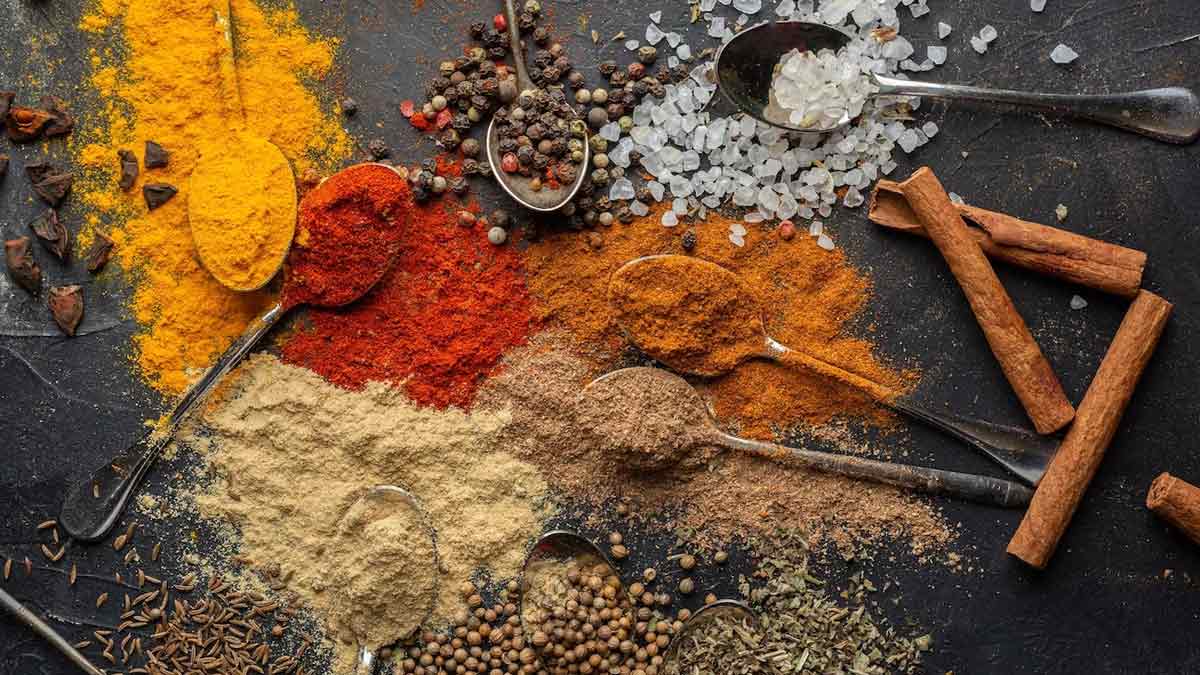
Indian spices are famous around the world. They make foods taste extraordinary and hold a myriad of benefits, including promoting skin health. Rich in antioxidants and anti-inflammatory properties, many of the spices aid in reducing skin issues like acne and inflammation. These spices can also help improve skin tone, combat pigmentation, and contribute to a healthier complexion when used externally or incorporated into your diet. In this article, we will discuss the many Indian spices that can improve skin health.
Table of Content:-
Turmeric (Haldi)

Turmeric contains a powerful antioxidant and anti-inflammatory compound called curcumin, which is said to help reduce acne, lighten dark spots, and promote a healthy glow. It can be used as a face mask by mixing it with yoghurt or honey and applying it to your skin or can be taken orally mixed with milk. A systematic review published in the Journal Phytotherapy Research suggests that people who received turmeric/curcumin treatment saw a "significant improvement in skin disease severity" as compared to the control groups.
Also Read: From Turmeric To Black Pepper, Various Indian Spices And Their Health Benefits
Cinnamon (Dalchini)
Cinnamon is said to have antimicrobial and anti-inflammatory properties, which helps manage acne, improves blood circulation to the skin, and promotes collagen production. According to a 2012 study published in the American Chemical Society, Ceylon cinnamon extract possesses the ability to promote and enhance the process of collagen synthesis in the body.
This suggests that the consumption or application of Ceylon cinnamon extract may assist in the production of collagen, a protein that helps maintain skin's elasticity, firmness, and reduces wrinkles, fine lines, and promotes a more youthful complexion.
Fenugreek (Methi)

Just like the above-mentioned spices, fenugreek seeds are rich in antioxidants and have anti-inflammatory properties that help in reducing skin redness and irritation. Research has shown that fenugreek extract can also treat skin conditions-associated skin irritation and pain.
Cardamom (Elaichi)
Packed with antioxidants, cardamom can help detoxify the skin. Cardamom seed essential oil offers remarkable benefits for your skin, aiding in eliminating blemishes, dark spots, and acne marks. It is best to seek out organic skincare products infused with cardamom or explore the option of using the essential oil directly.
Also Read: These 5 spices from your kitchen can give you a fair complexion
Saffron (Kesar)
Saffron is known for its skin-brightening properties and is said to help in reducing pigmentation. According to a study published in the Journal Current Pharmaceutical Design, saffron has demonstrated its effectiveness in treating a variety of skin conditions, thanks to its potent combination of antioxidant, antimicrobial, depigmenting, and reparative properties. It addresses issues, such as skin diseases, oxidative damage, microbial infections, uneven pigmentation, and the promotion of skin repair.
Amla (Indian Gooseberry)

Amla serves as a natural blood purifier and is therefore said to reduce pimples and accelerate the skin's healing process. It not only safeguards the radiance of your skin but also combats blemishes, fine lines, and wrinkles. It is also rich in vitamin C, which plays a significant role in boosting collagen production, reducing skin ageing signs, and giving you a brighter, more youthful complexion.
Bottomline
While Indian spices hold several skin benefits, individual skin types vary and therefore, it's essential to do a patch test before applying any spice-based remedy to your face. This helps ensure you don't have an adverse reaction. Additionally, it's always a good idea to consult with a dermatologist for personalised skincare advice.
Also watch this video
How we keep this article up to date:
We work with experts and keep a close eye on the latest in health and wellness. Whenever there is a new research or helpful information, we update our articles with accurate and useful advice.
Current Version